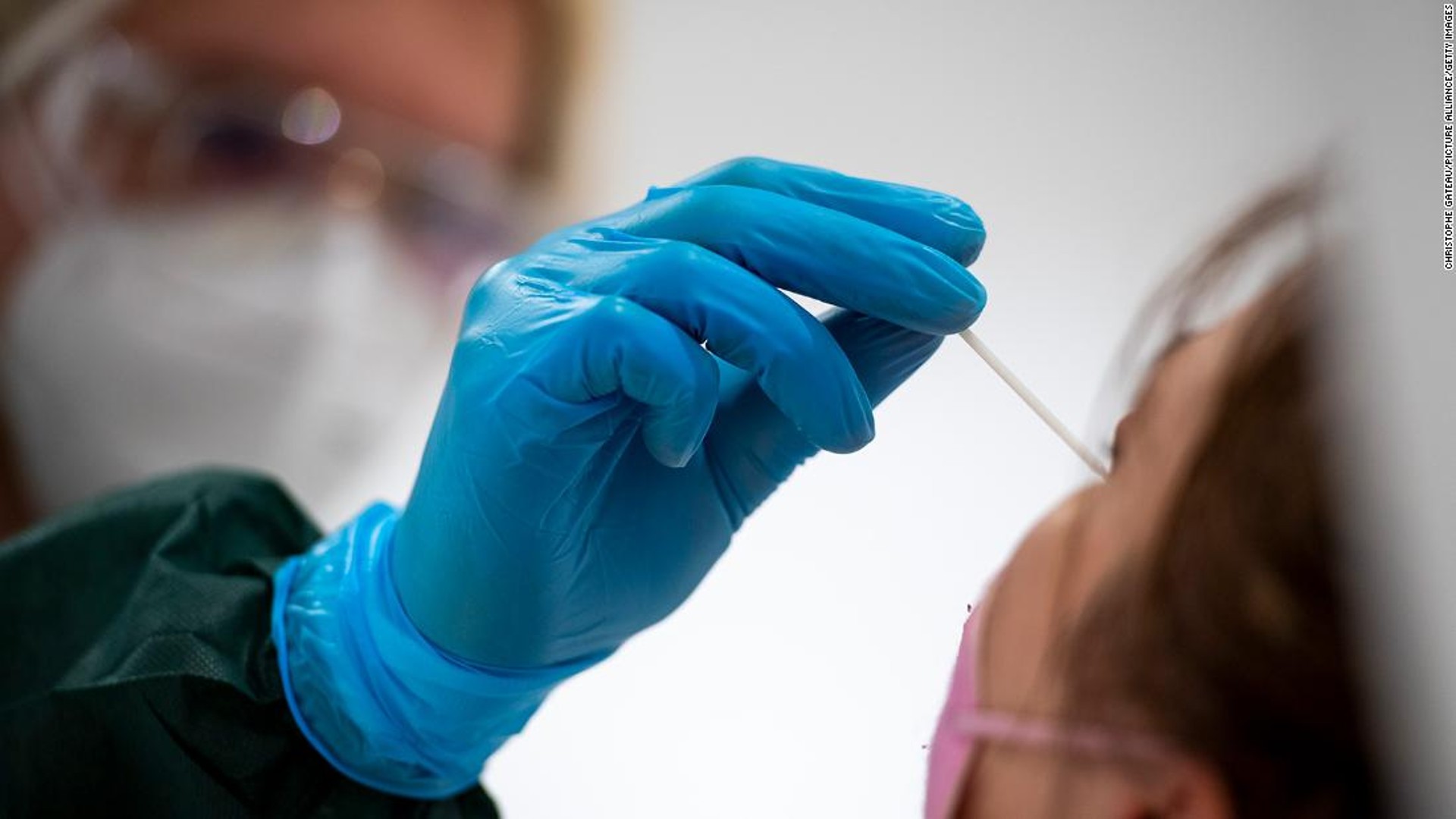Patient with prolonged covid-19 recounts his struggle to find medical help 3:58
(CNN) ––
Getting sick with covid-19 is bad enough.
But what if you are one of the unlucky people who also experiences what has been called prolonged covid-19?
It's a mix of symptoms that can strike months, and even years, after recovering from Covid-19, according to a new study that included more than a million people from eight countries.
Suffering from covid-19 on multiple occasions increases the risk of suffering from prolonged covid, indicates study
The risk for adults of developing seizure disorders, brain fog, dementia and other mental health conditions remains high two years after recovering from Covid-19, the research found.
"These are important findings, but they should not cause panic," said study co-author Paul Harrison, a professor of psychiatry at Oxford University in Britain.
"We're not talking about something that's 10 or 100 times more common. I think the worst odds ratio is two or three," he added.
How to know if you have prolonged covid-19 or 'long-covid'?
These are the symptoms to watch out for
Children were at higher risk of being diagnosed with epilepsy or seizures, encephalitis and nerve root disorders, which can cause pain, weakness or loss of sensation in an arm or leg.
There was also a small but concerning risk of having a diagnosis of a psychotic disorder such as schizophrenia or delusional thinking.
"This is an extremely robust and well-conducted study, using data from a large sample and across multiple nations," said Rachel Sumner, a senior researcher at Cardiff Metropolitan University in the United Kingdom, who was not involved in the study.
advertising
"The findings are alarming and critically important in our current context of sheer spread of COVID-19," he added by email.
What is prolonged covid and how do you live with it?
4:15
The study's conclusions are consistent with the clinical experience of Dr. Aaron Friedberg, a clinical assistant professor of internal medicine who works in the Post-Covid-19 Recovery Program at The Ohio State University Wexner Medical Center in Columbus.
"I just spoke to someone who was initially diagnosed with COVID-19 more than two years ago, but is only now seeing a post-COVID-19 specialist," said Friedberg, who was not involved in the study.
"That doesn't necessarily mean they're having symptoms two years later. It means they're just being diagnosed," she clarified.
New findings help explain the conundrum of prolonged covid
Friedberg also said he sees people with severe symptoms two years after diagnosis.
"They can't think, they can't breathe. I have a person whose illness is so severe that they basically can't get out of bed," he said.
"I recently saw a patient who is still unable to work due to covid-19 symptoms two years later."
Good and bad news
The study, published Wednesday in the journal
Lancet Psychiatry,
analyzed two years of hospital data on adults and children available on TriNetX, an international network of electronic health records.
TriNetX provides de-identified data on hospital, primary care, and specialist providers.
About 89 million patients are in this database.
Prolonged covid is a bigger problem than we think
The study looked at 1.25 million patients two years after they were diagnosed with COVID-19 and compared them to a similar group of 1.25 million people suffering from a different respiratory infection.
"We compared these two groups of patients with respect to 14 major neurological and psychiatric disorders in the two years after Covid-19 or respiratory infection," explained co-author Maxime Taquet, a clinical academic researcher in psychiatry at the Center for Biomedical Research at the Institute National Research Center for Health and Medical Care in the UK.
The research team evaluated these conditions: anxiety disorders;
mood disorders;
psychotic disorders;
insomnia;
cognitive deficit (a composite of indicators to capture the so-called brain fog);
dementia;
epilepsy or seizures;
encephalitis;
intracranial hemorrhage;
apoplexy;
Parkinson's disease;
Guillain-Barré syndrome;
disorders in the nerves, nerve roots and plexuses;
and neuromuscular and muscular diseases.
The researchers also looked at deaths from any cause.
Most of the patients were from the United States, but the study also included people from Australia, the United Kingdom, Spain, Bulgaria, India, Malaysia and Taiwan.
The research was unable to determine if people experienced ongoing symptoms for the two years since their Covid-19 diagnosis.
"That may or may not be the case, Taquet said. "These data only look at the number of new diagnoses being made, not the persistence or duration of symptoms," she clarified.
There was good and bad news.
Does the covid-19 vaccine help prevent prolonged symptoms?
Italian study suggests yes
For adults diagnosed with COVID-19, the risk of developing "mental confusion, dementia, psychotic disorders, and epilepsy and seizures remains elevated over the next two years" compared to those with other respiratory conditions, Taquet said.
Adults older than 65 had a 1.2% increased risk of being diagnosed with dementia, according to the study.
Although "it's very clear that this is not a tsunami of new cases of dementia, it's still (I think) hard to ignore, given the severity of the consequences of a dementia diagnosis," she added.
Now, Taquet added, there's some good news for adults: "The risk of some disorders -- particularly anxiety and mood disorders -- disappeared within two to three months, with no overall excess of cases in adults. two years later."
Effect on children of prolonged covid-19
Prolonged Covid affects children, even the smallest ones 0:40
There's good news for children, too: "The risk of brain fog in children was transient, there was no overall risk," Taquet said.
Children also had no increased risk of being diagnosed with anxiety and depression after Covid-19, "even in the first six months," she said.
But some findings are disturbing when it comes to other conditions.
For example, children had a "two-fold increased risk of epilepsy and seizures," Taquet said.
Also a "three times higher risk of being diagnosed with a psychotic disorder in the two years after having Covid-19, compared to those diagnosed with another respiratory tract infection," she added.
Children can also suffer from prolonged covid-19, and it can present itself in unexpected ways
In the study of 10,000 children diagnosed with COVID-19, 260 developed epilepsy and seizures within two years, compared to 130 of 10,000 children diagnosed with another respiratory tract infection.
Representing "twice as much risk," Taquet said,
In addition, a threefold increased risk of a diagnosis of a psychotic disorder was found in children, within two years of a covid-19 infection, Taquet said.
However, "the absolute risk is still quite low," she explained, with 18 diagnosed cases of psychosis out of 10,000 children.
"I think we need to be careful in interpreting the small increases that are reported in dementia and psychosis," said Paul Garner, emeritus professor of evidence synthesis in global health at the Liverpool School of Tropical Medicine in the United Kingdom.
Garner was not involved in the study.
"In my opinion, (the results) are more likely to be related to the social upheaval and dystopia that we have experienced rather than being a direct effect of the virus."
A long-term impact
Overall, the study evidence is "particularly concerning," Sumner said, because even variants of Covid-19 that are considered milder appear to have the same long-term consequences.
Long-term covid-19 can be a chronic (and very expensive) disease for millions of people
Additionally, "some of these disorders will continue to face delays in diagnosis and treatment amid health care systems struggling to deal with both COVID-19 infections and backlogs on patient waiting lists," Sumner added.
That reality matches the clinical experience of doctors like Friedberg, who has been treating Covid-19 patients for a long time since shortly after the pandemic began.
"I have severe post-Covid-19 (patients) from the original March 2020 strain, and I have the same thing in people who developed it a few months ago. So I think it can be equally severe with any of these variants," he warned.
However, Friedberg told CNN that there have been "zero public policy decisions" about what happens after Covid-19.
"The idea that maybe something terrible is going on that we won't notice until months or years later is not being adequately addressed," Friedberg said.
"Let's say kids just can't run as much as they used to, or now they have seizure disorders. Or adults just can't handle as many tasks at work or have trouble caring for their kids at home because they're just brain fogged, or suffering of chronic shortness of breath," he continued.
"If that starts to happen to, say, 5% of the population every time there's a wave of Covid-19, that starts to add up," he said.
Prolonged CovidCovid-19Risk








